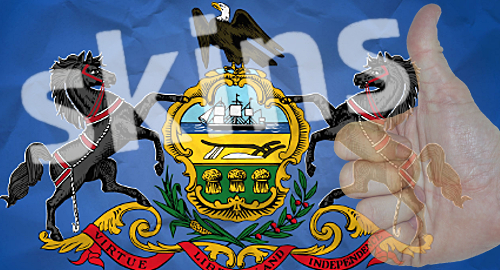 Pennsylvania will permit its online gambling licensees to host multiple ‘skins,’ which will allow companies from outside Pennsylvania to participate in its intrastate online gambling market.
Pennsylvania will permit its online gambling licensees to host multiple ‘skins,’ which will allow companies from outside Pennsylvania to participate in its intrastate online gambling market.
On Wednesday, the Pennsylvania Gaming Control Board published the latest installment of its rules and regulations governing its imminent online gambling licenses. The state will begin accepting interactive gaming certificate applications from its existing land-based casino licensees later this month, while technology providers will get their shot in June.
The new set of regulations (viewable in full here) addresses the contentious question of ‘skins’, aka whether an online licensee will also be able to host affiliated operators, as is the case in neighboring New Jersey. (NJ’s market-leading Golden Nugget casino, for example, offers its own online casino, in addition to Betfair- and SugarHouse-branded sites.)
The lobbying on this issue has been fierce in Pennsylvania, with Parx Casino and Penn National Gaming arguing against allowing any third-party sites, and online operators like 888 Holdings arguing to be allowed to piggyback on a local casino’s license, much as the company does in New Jersey via its partnership with Caesars Entertainment.
In the end, the PGCB opted not to hobble its online market out of the gate. In the section of the regs devoted to skins (starting on page 111), the PGCB says it will permit its interactive gaming certificate holders to ink deals “with multiple licensed interactive gaming operators to offer interactive games the Board has authorized the interactive gaming certificate holder to conduct.”
Clearly in quid pro quo mode, the PGCB also said it won’t restrain third-party companies from making deals with multiple interactive gaming certificate holders.
There are a few caveats. Third-party operators cannot offer online gambling to Pennsylvania customers “independent from an interactive gaming certificate holder and the interactive gaming certificate holder’s webpage or the webpage of an entity within the interactive gaming certificate holder’s organizational structure.”
Similarly, interactive gaming certificate holders and any third-party company offering services on behalf of the certificate holder “may only offer interactive gaming in this Commonwealth through the interactive gaming certificate holder’s webpage or the webpage of an entity within the interactive gaming certificate holder’s organizational structure.”
The above clauses appear to require third-party operators to piggyback on their interactive certificate holders’ domain name, which will likely mean some overly cumbersome URLs, but hey, can’t win ‘em all.
To ensure no player confuses just who’s the daddy here, all third-party operators “must, at all times, clearly identify the interactive gaming certificate holder or an entity within the interactive gaming certificate holder’s organizational structure, on the display screen visible to players.”